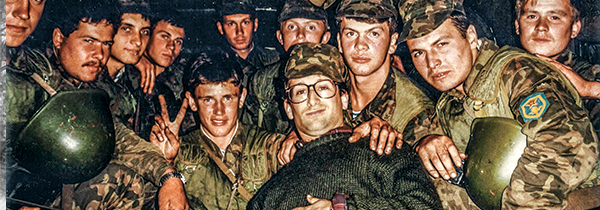 |
 |
||||||||||||||
| DiscoverCreate Act Cold War Story Dammed All the Smog in ChinaCharacter Sketch Brilliant! Time Out to Teach Give Them Shelter LaurelsConnectDepartments |

Cold War Story
OH, TO BE TWENTY-TWO AND RECKLESS AGAINOn a visit to Leningrad the summer after I graduated, I split off from my tour group to go sightseeing in Moscow. It was there that I unintentionally ended up impersonating a photojournalist—my sole credential being a large 35mm camera—during the August 1991 coup d’état attempt against Gorbachev by hard-line communists. Dozens of idling camouflage-green tanks and countless somber-looking soldiers gathered near the Arbat, a tourist hot spot full of small shops and vendors. Civilians, most of them as surprised to see the tanks as I was, milled about, talking to soldiers. With just the camera to defend myself against what seemed like most of the Soviet army, I did something only an awestruck twenty-two-year-old would think was a good idea: I climbed up onto one of the tanks and began taking pictures. I knew I was putting my life at risk, but this was history, possibly even the end of the Soviet Union.
I looked around, mumbling the sorts of things I imagined news photographers mumbled: That’s it. There you go. Come on out. Show your face so I can take the picture. That’s it. The smug-looking soldier peered from the hatch of his tank and glanced at me. I pressed the shutter button. Adjusting my oversized brown plastic glasses, I peered through the lens and snapped more photos. Soldiers cleaning their rifles. Commanders barking orders. Running on adrenaline, I was taking risks I had never dreamed of, and relishing every moment.
Out of the corner of my eye, I noticed a soldier spring from a hatch about ten tanks ahead of me. He was tall and blond, with broad shoulders, and was squinting around for something. I lowered my camera and his eyes locked on to mine. I looked away nervously, realizing I had no explanation for why an American tourist should be standing atop a Soviet army tank a few miles from Red Square.
A woman screamed in Russian, waving her arms, hollering for me to get down. Crap. The strapping soldier ran toward me, leaping from tank to tank. He seemed to have orders—and it appeared I was his target. Suddenly, the tank I stood on jolted to life. Exhaust fumes filled the air. Steel hatches dropped shut. The approaching soldier yelled something unintelligible, an angry scowl on his face as I stood panicking in the plumes of smoke.
I closed the dusty photo album and sighed. The kids were off with their grandparents, and my wife was rehearsing for a musical at our synagogue. Sipping my morning coffee during this rare moment of solitude, I marveled at that kid, exactly half the age I am today. Was it really me? Was I ever capable of putting myself in such peril? For a moment, the more conservative life I live today, with its responsibilities and pressures, felt foreign.
I remembered all the freedom my parents had given me growing up. Whether allowing me to spend unsupervised days playing in a park or insisting I make my own decisions about activities, educational pursuits, and relationships, they instilled a great sense of self-reliance, and, in turn, confidence. Would I allow my eleven-year-old son or eight-year-old daughter the same latitude? Could I find the courage to let them explore the world, even if they took risks as boneheaded as the time I stood on that Soviet tank?
Before the angry soldier could grab me, I jumped to the asphalt. Coughing and wheezing in the exhaust, I crawled to a grassy area, where I turned over and faced the sky, my heart beating out of my chest. It was then that I grew emboldened to stay in the USSR beyond my four-week sightseeing tour. With the fall of communism, opportunity was sure to find me, I thought.
I remained in the new Russia for close to three years. I taught English in St. Petersburg and then got into real estate development in Moscow. Majoring in Soviet and East European studies had provided book knowledge, but living abroad provided more. Speaking with Russians about their impressions of American policy and debating the benefits of democracy with people who didn’t believe in it, I realized that the success of our international community relies on discussion and empathy. I returned home more focused and determined, and genuinely interested in world events.
The rattle of keys at the front door interrupted my thoughts. My son—his inquisitive eyes and uncombed bushy brown hair not unlike my own at that age—charged into the kitchen. He grabbed the unfamiliar photo album and began studying its contents. He eyed me questioningly. I pulled a chair in behind his legs and said, “Sit down, buddy. I want to tell you about a trip your dad took a long time ago.”
DAVID A. KALIS, A91, is the author of Vodka Shot, Pickle Chaser: A True Story of Risk, Corruption, and Self-Discovery Amid the Collapse of the Soviet Union (details at www.davidakalis.com).